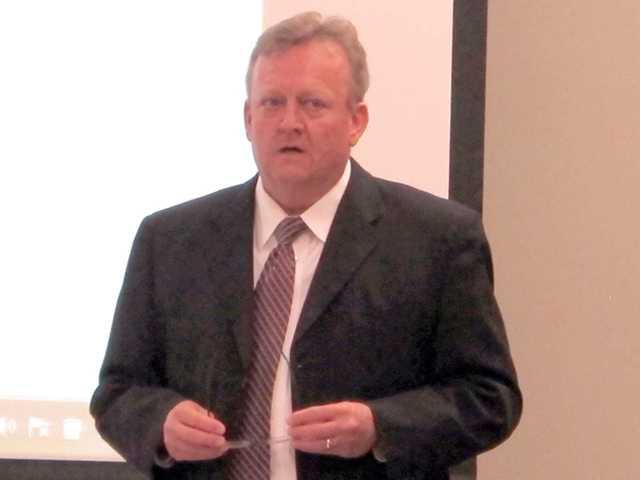The Coastal Regional Commission heard a special presentation about alternative fuels during its April meeting Wednesday at Richmond Hill City Center.
Commission members and guests heard from several industry professionals about costs savings to local governments that convert public transportation vehicles, sanitation vehicles, law enforcement vehicles and school buses to propane-powered engines.
Former Chairman Daniel Cotty began the presentation by reviewing the steps he and other members had taken to learn about alternative fuels for the 89 Coastal Coaches owned by the Georgia Department of Transportation but run by the commission to provide affordable transportation for rural communities.
“We burn about 350,000 gallons of gasoline a year at a cost of approximately $1.2 million a year,” said Cotty, who also noted the commission’s fleet totals more than 50,000 miles a year. “A year ago, we started looking at (alternative fuels). We went to Atlanta to take a look at (compressed natural gas) then we had a ‘lunch and learn’ session in Brunswick to learn about propane.”
Cotty said both CNG and propane are answers to the country’s energy problems, but he thought CNG is better suited for larger metropolitan areas like Atlanta due to infrastructure requirements.
For rural areas like Coastal Georgia, propane is the better alternative fuel, he said, noting that it sells for about $1.50 per gallon compared to the current average gas price of $3.87 per gallon.
“Propane can be produced by refining petroleum, or it can come from natural gas,” said Clint Land, chief executive officer of Coastal Energy of Richmond Hill. “Many large cities are turning to alternative fuels like CNG and propane. For nearly 100 years, the price of propane increased with increased oil prices. But with new technology producing propane from natural gas, the price of propane is actually going down.”
Because technology also allows propane to be delivered in liquid form rather than as a vapor, propane engines are more efficient, Land said. He said that 97 percent of the propane used in this country is produced here or in Canada, and that propane engines reduce greenhouse gasses by 24 percent and have the same horsepower and torque as gasoline engines.
Todd Mouw, vice president of ROUCH Clean Tech, also praised propane as a viable alternative fuel.
“We like propane because it’s right here and right now,” said Mouw, whose 35-year-old company has 3,300 employees in Michigan and North Carolina. “It costs $2 per gallon less than gasoline, and it burns cleaner, which reduces maintenance costs because it extends the life of the engine. And with current shell finds containing natural gas, there is more natural gas in the U.S. than there is oil in the Middle East.”
Other guest speakers included Keith Strickland, sitting president of the Georgia Propane Association and general manager of Claxton Oil Company, and Archie Brass, account manager with Yancey Bus Sales and Service.
Strickland offered to work with each city within the commission, whose 39 members represent 10 coastal counties, to provide an estimate for converting its fleet to propane. Brass talked about his company’s work through Blue Bird Bus Corporation building propane-powered school buses.
“I see propane as the motor fuel of the future,” Cotty said.

